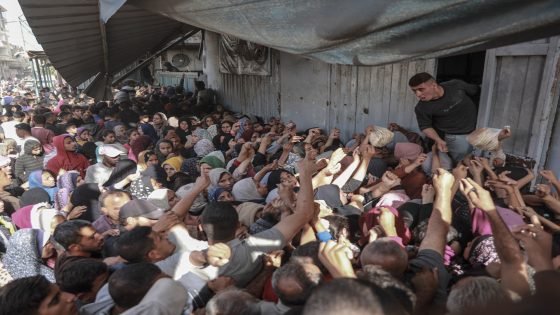Fadia Wadi finds herself resorting to using spoiled flour infested with weevils and worms after being unable to endure the massive crowds at the bakery gates.
“As you can see, this flour is spoiled, full of insects, and has a terrible smell,” Fadia explained as she painstakingly sifted out bugs before kneading the flour into dough. “But what choice do I have? Flour is either unavailable or too expensive.”
The 44-year-old mother of nine says hunger has forced her to make unimaginable compromises. Her eldest son was killed in an Israeli strike in northern Gaza in January, while her husband remains in the north, leaving her to provide for their eight remaining children.
“The war has pushed us into doing things I never thought I’d have to do just to feed my children.”
![Many families in central and southern Gaza resort to using spoiled flour if they have it [Abdelhakim Abu Riash/Al Jazeera]](https://nadapost.com/wp-content/uploads/2024/12/873A9118-copy-1733821974.jpg)
Although her children are reluctant to eat bread made from spoiled flour, Fadia feels it is safer than queueing at bakeries.
“I tried to get bread two days ago, but I came back covered in bruises from the stampede,” she explained while kneading. “A tragic, difficult life.”
While collecting food puts people at risk of being caught in a stampede, they also face the threat of Israeli strikes.
With vegetables, meat and poultry and basic staples like rice and pasta now unavailable or prohibitively expensive, Fadia has no option but to cook with insect-infested flour.
“Flour is missing, aid is scarce, and aid parcels haven’t arrived for months. How can I provide bread or food?” she asked.
“We used to throw this spoiled flour to the animals, but now we feed it to our children, not knowing or caring about the health risks,” she added. “Hunger drives us.”
Now dependent on charity distributions, Fadia describes a life dominated by endless waiting and long queues. “Everything here is a line — food, bread, water, everything,” she said.
“We are hungry, we crave everything. I don’t know what will happen to us.”





